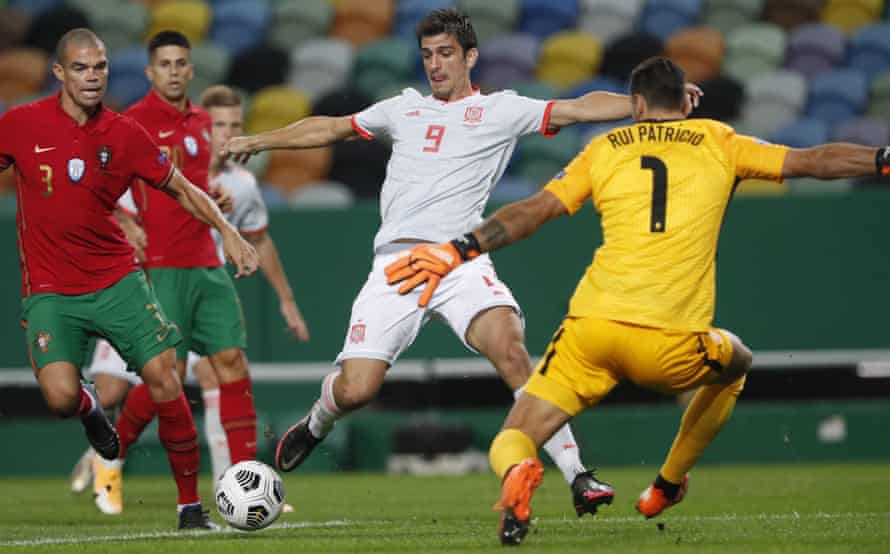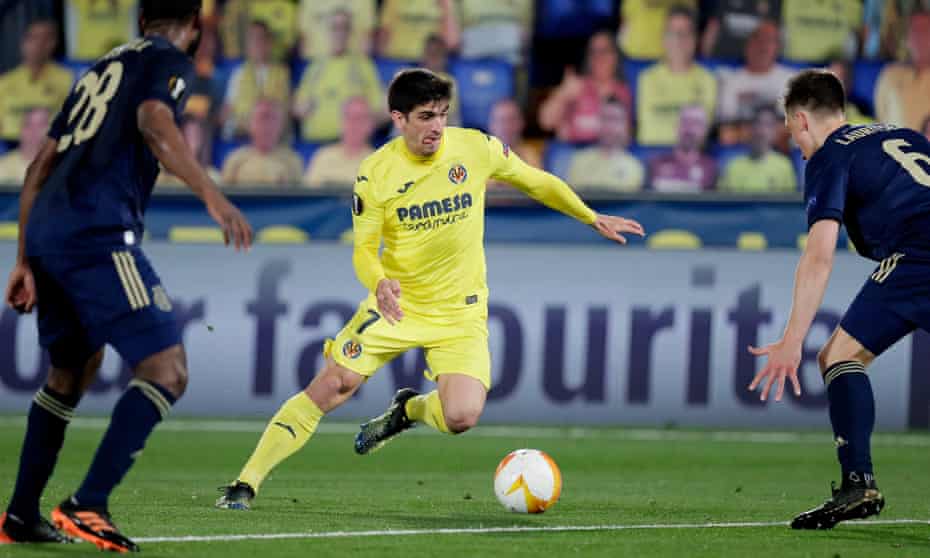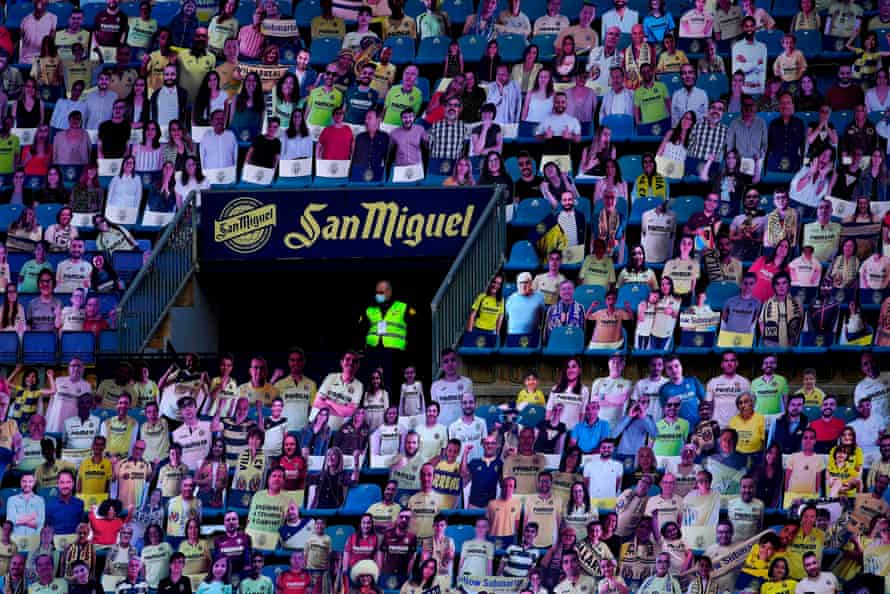“To tell you the truth, I don’t really like people talking about me and I don’t like seeing myself in the papers,” Gerard Moreno says.
Ah, right. Yeah. Sorry about that.
Not many people talk about Gerard Moreno, especially not Gerard Moreno, but they should. Maybe it’s how he moves, bent over the ball, something strangely perfunctory about even the most perfect, aesthetic moments, of which there seem to be more by the match. Maybe it’s the way he looks, barely changed from when he was a boy, front tooth chipped, hair cut rather than cultivated. Or maybe it’s the hint of timidity, the lack of a lobby and the team he’s at, the small town where the spotlight rarely falls. Because it’s not the football.
Or maybe it’s because it is just the football. And when it comes to the football, there are few like him, perhaps even Spain’s best player right now – Arsenal surely aware that stop Moreno and you don’t stop Villarreal exactly but you get pretty close. Scorer of 20 league goals, provider of five assists and 38 opportunities, having scored or assisted 16 goals in 14 games since the turn of the year, no La Liga player has a bigger proportion of his team’s goals. Of the five games he has missed, they have won one. In Europe he has scored or assisted in every knockout game – six matches, six goals, three assists – to lead Villarreal to Thursday’s semi-final. The only place smaller to have had a European semi-finalist is Monaco. “A challenge,” Moreno calls it.
Football has marked Moreno, the scar on his face coming from falling off a goal when he had gone to collect a ball that had landed on top of the net, leaving him needing 27 stitches. Raised in Santa Perpètua, a Catalan town of 25,000, a ballboy at Espanyol whom he joined at eight, fond memories of Raúl Tamudo celebrating a goal with him, his was a football family: his dad a striker, his brother a No 10. He’s “a bit of both”, he says. He is now: a No 9, a No 8, a No 7, and a No 10 in one. He is also a bit better than they were, however good he insists they were, footballers who made it to Tercera División, Spain’s fourth tier.
Yet few imagined he would be this good, this often. Even quite recently, they didn’t. Robert Moreno, who gave him his Spain debut in 2019, recalled him scoring a hat-trick aged eight. But it was 20 more years before that first cap, and Gerard had never played at youth level. At 29, he has played 10 times – scoring five goals. Once a finisher, Moreno is now the complete footballer, a process that began with Quique Sánchez Flores at Espanyol and has appeared to reach a state of near perfection at times this season.

“I was always a centre-forward. Quique put me up front, but dropping in and more involved and I felt comfortable, like I had found my place. That’s been reinforced by managers since, opening my options, allowing more freedom, more movement. You always learn new things and all the more so from a coach like Unai Emery. This is a group of players that like to treat the ball well, combine, and he’s reinforcing that. He’s a big part of the success in Europe: the preparation for the games, the contagious ambition, the experience in this competition. He’s won it various times, he’s on top of us, talks to everyone. Hopefully that stands us in good stead against Arsenal.” A glimpse of Emery’s intensity is offered inadvertently when Moreno doesn’t show up the first time this conversation is scheduled – the manager had seen him arriving for training an hour early and pulled him in to analyse the match.
It has been beneficial: this is Moreno’s best goalscoring season but it’s not only the figures, it’s the football itself; the impeccable touch, the absurdly executed moments, a catalogue of goals of rare quality yet a willingness to provide. Against Levante recently, he literally sent a defender falling off the TV screen, an air of Boateng at Messi’s feet. “99.9% of the time he makes the right decision,” Robert Moreno said.

He is also, the former Spain manager told Marca, “a player you’d let marry your daughter. A polite, honest, hard-working lad with the patience and humility to wait, work to improve.” Fairly unremarkable, he is not massively muscular, shirt clinging tight to his torso, and no huge ostentatious tattoos; it is tempting to conclude he doesn’t look much like a footballer. Ask him about his role, his level, his importance and he returns repeatedly to his teammates. He speaks in plural because he includes the family that “took me everywhere”. They are a “pack”, he says, insisting he would “never, ever” make a decision without them, proud they can enjoy these moments. More, in fact, than he does.
So does he not? “Yes, of course,” he says. “We’re doing what we like, what I dreamed of as a kid. It’s true that there’s responsibility, tension, sacrifice, but I wouldn’t change it for anything. I talk about my family because that’s just the way I see it. Reaching a semi-final is theirs too.” Staff and teammates insist it is no act or well-worn cliche; he is unusually lacking in ego. It’s partly his own fault people don’t talk about him, then. He shrugs. “If people say good things about me, that’s nice. But it’s not something I lose sleep over. Maybe Villarreal don’t have the media spotlight like Barcelona, say, but on the inside we know this is a big club.”
Now comes a moment that could change things. Could this be the most important game of his career? “I suppose so, because of the context; it’s very important for the club,” he says. “We know how hard it is for teams to reach a semi-final and all the more so for Villarreal. Four times the club has been stopped at the gates of a final and our challenge is to go a step further, make history. Lots of us have been in the youth system here, so we see it as even more special. God willing, we can break that barrier.”

Alas, the only fans at Villarreal’s ground are cardboard cutouts and nor will the Emirates be the place Santi Cazorla told him about. “If you talk to him, you know how much he loves Arsenal,” Moreno says, smiling. “Personally, I think the cutouts are a nice idea. There are no people but you feeling like the stadium isn’t empty … hopefully in a few years we’ll meet again and they [the fans] can come.”
That is an opportunity that would be denied by the super league. “You see Arsenal, Manchester, Roma in the Europa League: big, world cities. And we’ve managed to put Villarreal among the best, earned the right to play a semi-final. It means a lot. This is Villarreal’s fifth European semi and we want to make history for the club, be the first.” Now that would be one report worth reading, a cutting to keep.
from Football | The Guardian https://ift.tt/334SbQp
via IFTTT

No Comment